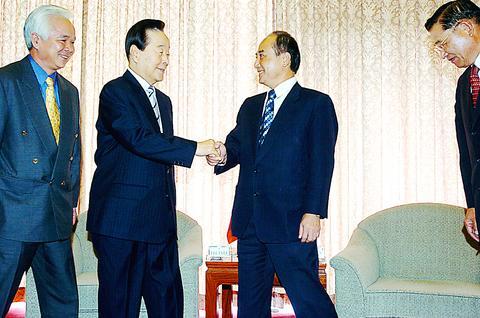Taiwan is a sovereign country with national and local leaders directly elected by its people, former South Korean president Kim Young-sam said yesterday.
Accompanied by Minister of Foreign Affairs Mark Chen (陳唐山), Kim held his first press conference since arriving in Taipei on Monday.

PHOTO: GEORGE TSORNG, TAIPEI TIMES
"Taiwan has a 23-million strong population. Its people elect the president, legislators and local governors. Taiwan is a sovereign nation," Kim told reporters at the Grand Hotel.
"Under the current circumstances, South Korea must develop its relations with China. However, Taiwan's existence is a fact that cannot be ignored," Kim said.
"Taiwan and South Korea should properly nurture bilateral political and economic ties," he said.
Chinese officials had endeavored to stop Kim from making the eight-day trip to Taiwan. They managed to persuade some of Kim's close friends to ask him not to visit Taipei and dispatched an official to his house to give him "gifts."
Kim, who was in Japan when the Chinese official visited his house, said the official explained Beijing's position on his Taiwan visit to his secretary.
"The official said China would like to invite me for a visit. He said I could meet with anyone I wanted to. Chinese officials approached me through various channels, but I was unmoved," Kim said through an interpreter.
Asked whether he was worried his trip to Taiwan would prompt condemnation from China, Kim said that for the moment he had no need to visit Beijing.
"In the future, if circumstances allow, I will visit China. Just see how things evolve," he said.
President Chen Shui-bian (
Kim, who met with former Chinese president Jiang Zemin (
Jiang once expressed sympathy concerning the difficulties South Korea faced owing to its unresolved reunification problem with North Korea.
"China has its reunification problem, too," Kim quoted Jiang as saying.
"I don't think President Hu Jintao's (胡錦濤) Taiwan policy would be much different from Jiang's. I believe countries should keep in contact through dialogues," he said.
"Taiwan plays a significant role in Northeast Asia and the US should guard the safety of Taiwan," Kim said.
Kim, who visited the Democratic Progressive Party (DPP) headquarters after the press conference, said the Taiwanese people do not need to overreact to Powell's remarks.
"Politicians sometimes made mistakes. This is inevitable. Politics cannot deny the reality. China never ruled over Taiwan. For the moment, China would not invade Taiwan because Taiwan is capable of defending itself," he said.
Kim also said he believed the DPP would perform brilliantly in the coming legislative elections.

Right-wing political scientist Laura Fernandez on Sunday won Costa Rica’s presidential election by a landslide, after promising to crack down on rising violence linked to the cocaine trade. Fernandez’s nearest rival, economist Alvaro Ramos, conceded defeat as results showed the ruling party far exceeding the threshold of 40 percent needed to avoid a runoff. With 94 percent of polling stations counted, the political heir of outgoing Costa Rican President Rodrigo Chaves had captured 48.3 percent of the vote compared with Ramos’ 33.4 percent, the Supreme Electoral Tribunal said. As soon as the first results were announced, members of Fernandez’s Sovereign People’s Party

EMERGING FIELDS: The Chinese president said that the two countries would explore cooperation in green technology, the digital economy and artificial intelligence Chinese President Xi Jinping (習近平) yesterday called for an “equal and orderly multipolar world” in the face of “unilateral bullying,” in an apparent jab at the US. Xi was speaking during talks in Beijing with Uruguayan President Yamandu Orsi, the first South American leader to visit China since US special forces captured then-Venezuelan president Nicolas Maduro last month — an operation that Beijing condemned as a violation of sovereignty. Orsi follows a slew of leaders to have visited China seeking to boost ties with the world’s second-largest economy to hedge against US President Donald Trump’s increasingly unpredictable administration. “The international situation is fraught

MORE RESPONSIBILITY: Draftees would be expected to fight alongside professional soldiers, likely requiring the transformation of some training brigades into combat units The armed forces are to start incorporating new conscripts into combined arms brigades this year to enhance combat readiness, the Executive Yuan’s latest policy report said. The new policy would affect Taiwanese men entering the military for their compulsory service, which was extended to one year under reforms by then-president Tsai Ing-wen (蔡英文) in 2022. The conscripts would be trained to operate machine guns, uncrewed aerial vehicles, anti-tank guided missile launchers and Stinger air defense systems, the report said, adding that the basic training would be lengthened to eight weeks. After basic training, conscripts would be sorted into infantry battalions that would take

GROWING AMBITIONS: The scale and tempo of the operations show that the Strait has become the core theater for China to expand its security interests, the report said Chinese military aircraft incursions around Taiwan have surged nearly 15-fold over the past five years, according to a report released yesterday by the Democratic Progressive Party’s (DPP) Department of China Affairs. Sorties in the Taiwan Strait were previously irregular, totaling 380 in 2020, but have since evolved into routine operations, the report showed. “This demonstrates that the Taiwan Strait has become both the starting point and testing ground for Beijing’s expansionist ambitions,” it said. Driven by military expansionism, China is systematically pursuing actions aimed at altering the regional “status quo,” the department said, adding that Taiwan represents the most critical link in China’s